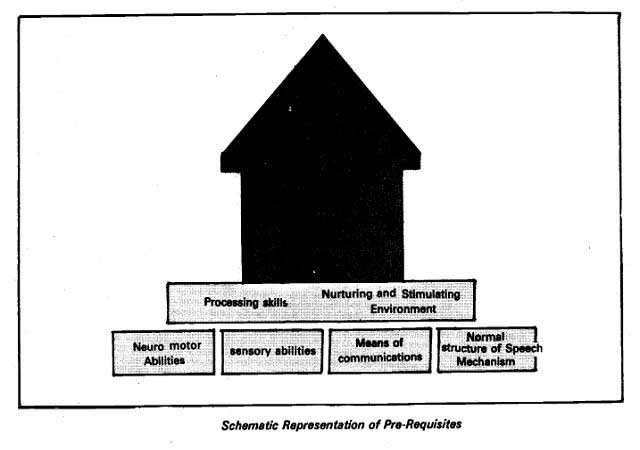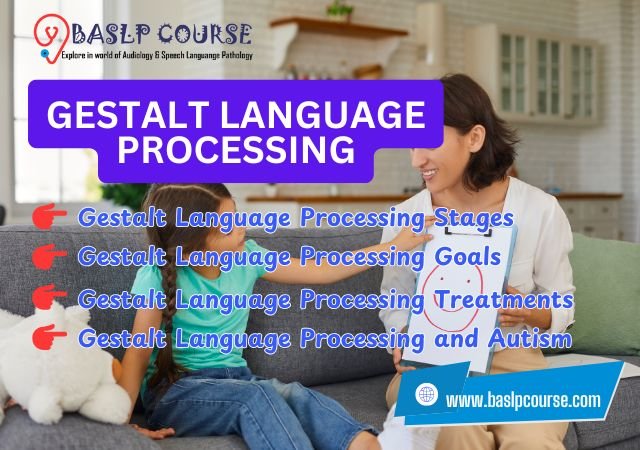Prerequisites for Normal Speech and Language Development: The following skills and capacities are essential for individuals . In order to achieve normal speech and language development. One must have brain , nervous system that is neuromotor abilities, functional vocal tracts, adequate movement of articulators for the development of speech as well as language.

Sensory abilities
It’s important to have good hearing and vision if you want to learn how to communicate verbally and in writing.
Motor skills
Motor skills range from the ability to produce speech sounds to the ability to form manual and signs as a means of communication. One of the most intricate motor functions used by the brain to express thoughts and emotions is speech. Motor acts also include writing, signing, miming, gesticulating, and other language expressions. Expression in both speech and non speaking modes may be hampered by insufficient motor skills.
Speech Production Mechanism
In order to produce speech, the speech production mechanism must be adequately functioning. Speech and language development are delayed if the movements of the mechanism’s structures, such as the lips, tongue, and throat, are impaired. This causes the creation of sounds to be improper.
Speech Processing Skill
Processing abilities: A person may be able to hear, see, and produce speech sounds, yet they may still be unable to communicate. Receiving sensory information and using it for expression are necessary for communication. Individuals should be able to process information in a number of ways in order to communicate meaning and infer meaning from sensory input (such as what is heard). A person needs to be able to do the following in order to receive sensory input:
- Pay attention to stimuli (what is heard, seen, or felt);
- Assign meaning to what is heard (word association with meaning);
- Store in memory and recall what was heard or seen;
- Recognize different symbols or sounds of his language.
- arrive at judgments and answers through logic and reasoning
- Generalize ideas and concepts to various situations.
Stimulating Environment
Language learning doesn’t happen in a bubble; it takes place in a social and environmental setting. As listed below, at least three environmental factors are essential for fostering language acquisition: Language derives from both people and their surroundings.
First, important aspect is an emotionally caring relationship with a caregiver/parent, who provides rewards for the child’s attempts to communicate. A Child while enjoying interaction continues to listen and use language. The individual must know that by saying or doing something, she can affect the behavior of another person in specific ways. The individual must have some appreciation of cause and effect. At a more sophisticated level, the individual needs to learn to converse with other people, starting from the caregiver. A Child must learn to take turns in conversation, to understand what other person knows, etc., which are the rules for a good conversation. Appropriate usage of language is encouraged by the caregivers and as a result, child acquires language.
Second, important aspect of a stimulating environment is atleast one speech mode/ person using simple but well formed language patterns. A Child tries to speak like(imitate) an adult while producing sounds, words, intonations etc. Speaking to a child, adults are known to simplify their language like by speaking in simple sentences, and slowly so that child can easily understand and pick up language
Third, important aspect of a stimulating environment is providing opportunities to communicate or help the child to have something to say. In order to be able to communicate in an environment, the child should find preferences or felt needs. They will be to comment on objects, events, people and their relationships, i.e., knowledge and understanding of various aspects of the world. Having the ideas will allow the child to interact.
Here, the child needs to have a reason for communication. If there is nothing in the environment which he wants or if he does not enjoy interaction, then there is no reason to communicate. If a child is not given an opportunity to communicate he is certainly not going to use language. Similarly we should stimulate a child so that he gets interested in the happenings in the environment and finds a need to communicate. During such an interaction language is acquired.
Means of Communication
A child needs a way to express his wants, needs, feelings, etc. Speech, manual communication, or sign language are all possible. The youngster must possess the processing abilities listed above when dealing with any other.
Factors Affecting Speech and Language Development
Speech and language development is a multifaceted process influenced by various factors. Early communication skills, hearing abilities, cognitive skills, social interactions, motor skills, and environmental factors all contribute to the acquisition and progression of speech and language skills in children. Understanding these prerequisites can help parents, caregivers, and educators create a supportive environment that fosters optimal speech and language development.
Early Communication Skills
For acquiring communication a child must have few skills before it is stimulated by the environment with language. These includes prelinguistic skills, joint attention and turn taking.
Prelinguistic Skills
Before children start using words, they develop prelinguistic skills that lay the foundation for language acquisition. These skills include eye contact, babbling, imitating sounds, and gesturing. By engaging in these prelinguistic behaviors, children learn to communicate and interact with their caregivers.
Joint Attention
Joint attention refers to the ability to focus on an object or event together with another person. It plays a crucial role in language development as it enables children to share experiences, follow directions, and understand the intentions of others. Joint attention can be fostered through activities like playing, reading books, and engaging in interactive conversations.
Turn-Taking
Turn-taking is another essential skill that facilitates communication. It involves the exchange of ideas, thoughts, and information in a conversation. By learning turn-taking, children develop the ability to listen, wait for their turn, and respond appropriately. This skill enhances their language comprehension and expression.
Hearing Abilities
Hearing is fundamental to speech and language development. Children with normal hearing are exposed to the sounds of their environment, which helps them acquire language naturally. On the other hand, children with hearing impairments may face challenges in learning spoken language and may require additional support, such as hearing aids or cochlear implants.
Cognitive Skills
Cognitive abilities play a significant role in speech and language development. The following cognitive skills contribute to the acquisition and understanding of language:
- Attention and Memory
- Problem Solving
- Symbolic Thinking
Attention and Memory
Attention and memory skills enable children to focus on relevant information, process it, and retain it for future use. These skills are crucial for following instructions, understanding narratives, and building vocabulary.
Problem-Solving
Problem-solving skills involve the ability to think critically and find solutions to challenges. Language development benefits from problem-solving skills as children learn to use words to express their thoughts, negotiate, and communicate their needs effectively.
Symbolic Thinking
Symbolic thinking refers to the understanding that words represent objects, actions, and ideas. It enables children to use language to convey meaning, engage in pretend play, and understand abstract concepts. Symbolic thinking is an essential precursor to language development.
Social Interaction
Language is primarily a social tool used for communication and building relationships. Children learn language through social interactions with parents, siblings, peers, and other caregivers. Positive and supportive social environments encourage language development by providing opportunities for conversation, storytelling, and meaningful interactions.
Motor Skills
Motor skills, both gross and fine, are closely linked to speech and language development. Clear and intelligible speech requires precise control over the muscles involved in speech production. Fine motor skills, such as hand-eye coordination and finger dexterity, also play a role in activities like writing, drawing, and manipulating objects, which support language learning.
Environmental Factors
The environment in which a child grows up significantly influences their speech and language development. A language-rich environment with exposure to diverse vocabulary, books, and interactive conversations stimulates language acquisition. Conversely, a lack of linguistic stimulation or exposure to negative language models may impede language development.
Multilingualism and Bilingualism
Growing up in a multilingual or bilingual environment can positively impact speech and language development. Research suggests that children exposed to multiple languages from an early age show enhanced cognitive flexibility, problem-solving skills, and a deeper understanding of language structures. Multilingualism provides children with a broader linguistic repertoire and cultural appreciation.
Identifying Potential Speech and Language Delays
While speech and language development follow a general timeline, some children may experience delays or difficulties. Early identification and intervention are crucial for addressing these challenges effectively. If a child exhibits persistent difficulties in speech production, understanding language, or social communication, it is important to seek professional assessment and support from speech-language pathologists or pediatricians.
References:
⇒ Manual on Developing Communication Skill in Mentally Retarded Persons T.A. Subba Rao (Page no. 83) [Book]
You are reading about:
Prerequisites for Normal Speech and Language Development







0 Comments